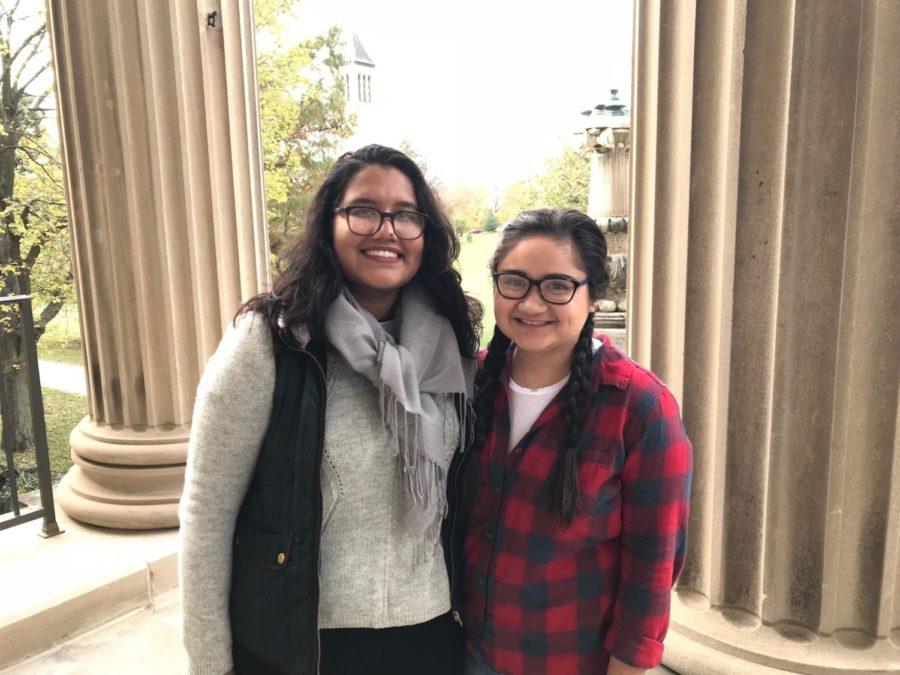Promoting cultural competency through CALS diversity programs
Madeline McGarry/Iowa State Daily
Valeria Cano Camacho (left) and Megan Kemp (right), juniors in agronomy and global resource systems, have become involved in the CALS diversity program through the LEAD IT initiative.
November 2, 2017
From internship programs to fireside chats, the College of Agriculture and Life Sciences’ diversity and inclusion program is aspiring to engage students of all ethnic backgrounds in their effort to advance cultural competency.
“We are trying to create a culture of community members who are more knowledgeable and more aware of the cultures around them,” said Theressa Cooper, College of Agriculture assistant dean for diversity.
Working cooperatively with additional College of Agriculture administrative figures, Cooper works to facilitate and manage the department’s central programs.
“[The position] gives the college and myself this unique opportunity to put forward some great diversity and inclusion efforts, and we really become a flagship for some of these programs,” Cooper said.
Although Cooper’s role is the only one of its kind at Iowa State, executing and overseeing the program’s efforts is largely a collective effort. Howard Tyler, assistant dean for College of Agriculture student services, and Elizabeth Martinez-Podolsky, multicultural liaison officer for College of Agriculture, both contribute to the progression of the program’s initiatives.
“It takes all of us working together to really have a robust program,” Cooper said.
Cooper hopes to see the diversity program inspire students of all races and creeds to empathize with the multicultural community and enhance their understanding of culture and diversity.
“We want to create a space where everyone is welcome and feels included, but some of that starts with self,” Cooper said.
A number of key initiatives have defined the cultivation of the College of Agriculture diversity and inclusion program. The George Washington Carver internship program has served to be a key component of the department’s efforts for nearly three decades. It has attracted students from all over the country, from individuals at the high school level to prospective graduate students.
“That is one of our signature programs in our office that touches the community,” Cooper said.
The department recently launched a video project known as “Creating Inclusive Communities.” The effort has documented perspectives from multicultural students to College of Agriculture faculty and staff as it relates to encouraging inclusiveness within the college.
From the wide collection of video testimonials, both positive and negative assessments of College of Agriculture diversity and inclusion practices have emerged.
“Some of those stories were heart wrenching, but they gave us opportunities to do better, and to makes things better for everyone,” Cooper said.
Megan Kemp, senior in agronomy and global resource systems, admires the responsiveness to minorities’ concerns from College of Agriculture administrators.
“We can actually see the tangible results from the conversations with the dean,” Kemp said.
Following the recent completion of the project, Cooper and her colleagues have worked to develop the Leaders Enhancing Agriculture, Diversity, Inclusion and Trust (LEAD IT) initiative in order to improve the reach and effectiveness of the college’s diversity programs.
The initiative has established an ambassador group that works to advance intercultural competency and the ability to understand identity. Members serve as liaisons to campus organizations in order to better facilitate conversation related to the challenges of diversity and inclusivity.
“We feel like we’re the only ones when we are really not,” said Valeria Cano Camacho, LEAD IT member.
Cooper believes the effort has allowed for increased dialogue surrounding inclusivity issues across the makeup of the college.
“It’s not about how different we are, it’s about how we are alike, and sometimes all it takes is one commonality that we can find between us to spark conversation and this awareness of others,” Cooper said.
Supplementary to the experiential internships and leadership opportunities, a number of additional initiatives have allowed for involvement from the College of Agriculture community as a whole. Weekly “Lunch and Learn” sessions and even a book club have served as meeting places for engaging in dialogue about race, gender, class, unconscious bias and mental health issues.
“All of the “isms” are our problem as a community, and we need to address them together,” Kemp said.







